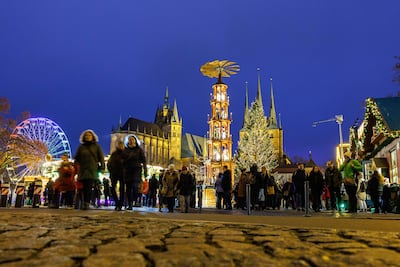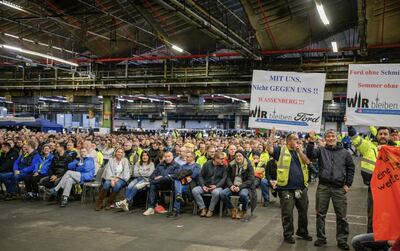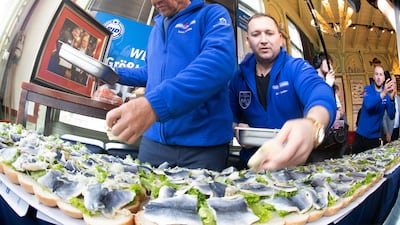Volkswagen workers are on strike, shopping for Christmas gifts is flat and some days you can't even buy a traditional Bismarck herring in a Munich sandwich shop. It is a tough time for the pillars of Germany's economic identity.
Intersport
Pickled herring was off the menu thanks to demands by 120,000 fast food and restaurant workers for a €15 ($15.77) an hour minimum wage, including at McDonald's, Burger King and fish chain Nordsee. "No fair pay offer? Then there's no fish rolls," was the slogan of this week's "warning strike" in Munich.
They are far from alone in venting their anger during a winter of discontent hitting all parts of society and undermining Germany's reputation as the powerhouse of Europe.
Doctors at 40 Lower Saxony hospitals stayed at home on Friday in pursuit of a hefty pay rise. Hermes and FedEx couriers have organised pre-Christmas strikes, warning parcel deliveries will be delayed or cancelled.
Employers see these demands as precisely the problem. Restaurants want looser rules on working hours and an end to political back-and-forths over wages. The stalemate has infected German politics, with a snap election looming after Chancellor Olaf Scholz's left-liberal government collapsed over economic policy.
Retailers say the election is affecting shopping habits as Germans squirrel away money in a period of uncertainty. Even the festive period – in which shops report "much better than expected" trading in Austria, another country renowned for its Christmas markets – has yet to bring relief further north.
“The German population currently seems particularly cautious given the economic situation," said Jessica Distler, a partner in Boston Consulting Group’s Berlin office. "This is also reflected in their shopping behaviour in the run-up to Christmas.”

Volkswagen strikes
Beyond the immediate uncertainty of an election campaign, there is much despair about the future of Germany's export-driven economic model. Cheap cars from China are jeopardising Germany's flagship car industry and Volkswagen has threatened to close domestic plants for the first time in its 87-year history.
An icon of Germany's post-1945 economic miracle, Volkswagen wants most of its fleet to be electric by 2030 but says savings are needed to invest in the green transition. An "anniversary bonus" for workers with 25 or 35 years' service is among the perks facing the axe.
About 40,000 workers joined a protest at Volkswagen HQ in Wolfsburg during a four-hour walkout this week, after a fourth round of talks collapsed. "We are ready to negotiate, but we are also ready to fight," union representative Christiane Benner said in a speech.
The strikes "will of course lead to breaks in production", although not so large in scale that they are expected to have a major economic impact in themselves, economist Timo Wollmershauser of the Ifo institute in Munich told The National.

He said forecasts for 2025 assume that manufacturers will increasingly move jobs and investment abroad, in what would amount to a "creeping deindustrialisation" of Germany. "While many economies worldwide are recovering and demand is rising, Germany's export-orientated industry is not profiting much," he said.
The auto industry unrest accompanied the German Chancellor on a visit to a Ford plant on Tuesday, where workers said they were ready to join the strikes. Mr Scholz vowed that Germany "is an industrial country and will remain one".
High energy prices pushed up by Russia's invasion of Ukraine exposed a further structural problem for German industry. Mr Scholz wants to bring in a cap on electricity prices before the lame-duck parliament dissolves for a February election. There is also a skilled labour shortage which his government has tried to tackle via the politically sensitive route of immigration.

Festive gloom
The uncertainty is dampening Christmas cheer for shops, who report a trend towards second-hand seasonal gifts. "People are giving presents, but overall keeping their money tight," said Alexander von Preen, who runs a German branch of outdoor goods brand Intersport and heads an association of German retailers.
"At the start of the year, hopes for overall economic development rested on private consumption. However, crises and insecurity have led to a noticeable reluctance to shop," he said. "This weak consumer confidence is continuing at the end of the year."
A row erupted after one party leader suggested Germany could learn from Argentina’s President Javier Milei and Donald Trump ally Elon Musk, who favour a slash-and-burn approach to government bureaucracy. Friedrich Merz, the favourite to be the next chancellor, said he was "appalled" by the idea.
Analysis by the Ifo institute shows that while inflation dropped and spending power rose roughly as expected in 2024, consumers failed to take advantage and pocketed an estimated €20 billion in savings. "Purchasing power has returned in the last few months, but the money has not been spent," Mr Wollmershauser said.
Germany's economy today is only 0.1 per cent larger than in the pre-pandemic conditions of late 2019, the worst performance among G7 countries. The label "sick man of Europe" is being applied for the first time since a 1990s and 2000s unemployment rut that followed the merging of the two Germanies.
Ex-chancellor Gerhard Schroeder is credited with turning things around with a reform package known as Agenda 2010 that cut benefits to push people into work. However, it led to protests and deep political splits at the time, and ultimately cost Mr Schroder his job at a snap 2005 election.
The Ifo institute's president Clemens Fuest used a speech this week to suggest a 'Growth Agenda 2030' including longer working hours and more use of AI by companies. It is the sort of proposal that will not improve the mood of workers who say employers must clear up their own mess.
"The Volkswagen management has made many wrong decisions for years," said Ms Benner, the union representative. "It is you who made VW successful and therefore I'm stunned by the board's actions. Instead of intelligent solutions they are offering closures and job cuts."


